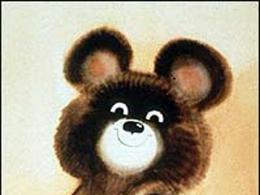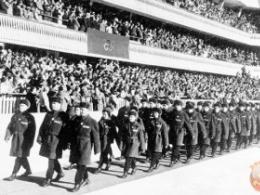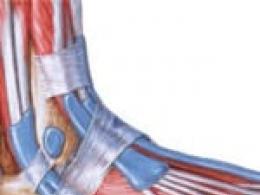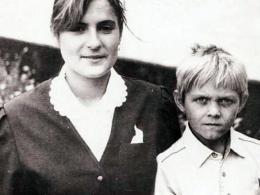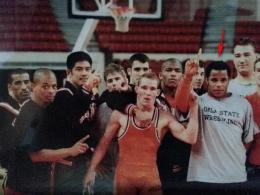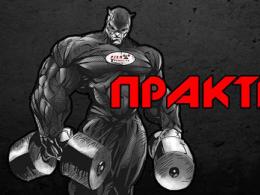USSR in the White Olympics. The most successful Winter Olympics of the USSR. Olympic Games in the USSR
60 years ago, on July 19, 1952, Soviet athletes took part in the Olympic Games for the first time.
Performance of the USSR/Russia national team at the Summer Olympics :
The Russian team took part for the first time in IV Olympic Games in London (Great Britain) in 1908. The Russian team won three medals, including one gold and two silver. In the overall team event (hereinafter the overall team event is based on the number of gold medals won), the Russian team was in 12th place.
On XV Olympic Games in Helsinki (Finland) in 1952 The USSR national team took part for the first time. Soviet athletes took second place in the unofficial team competition, winning 71 medals: 22 gold, 30 silver and 19 bronze.
On XVI Summer Olympic Games in Melbourne (Australia) in 1956 The Soviet Union team won 98 medals, including 37 gold, 29 silver and 32 bronze. In the overall team competition, the USSR team took first place.
On XVII Olympic Games in Rome (Italy) in 1960 The USSR team won 103 medals: 43 gold, 29 silver and 31 bronze. In the overall team competition, the USSR team took first place.
On XVIII Olympic Games in Tokyo (Japan) in 1964 The USSR team won 96 medals: 30 gold, 31 silver and 35 bronze. In the overall team competition, the USSR team took second place.
On XIX Olympic Games in Mexico City (Mexico) in 1968 The USSR team won 91 medals: 29 gold, 32 silver and 30 bronze and took second place in the team competition.
On XX Olympic Games in Munich (Germany) in 1972 The Soviet Union team performed more successfully than other teams, winning 50 gold, 27 silver and 22 bronze medals.
On XXI Olympic Games in Montreal (Canada) in 1976 USSR athletes were again the best - 49 gold, 41 silver and 35 bronze, a total of 125 awards.
On XXII Olympic Games 1980 in Moscow (USSR) The team of the host country won a convincing victory in the unofficial team competition - 195 medals: 80 gold, 69 silver and 46 bronze awards.
IN XXIII Olympic Games in Los Angeles (USA) in 1984 The USSR national team did not take part. The games were boycotted by most socialist countries.
On XXIV Olympic Games in Seoul (South Korea) in 1988 The national team of the Soviet Union won 132 awards: 55 gold, 31 silver and 46 bronze medals. In the overall team competition, the USSR team took first place.
XXV Olympic Games in Barcelona (Spain) 1992. After the collapse of the USSR in 1991, the United Team of Independent States competed at the Olympics (except for the Baltic republics, which competed as independent teams), which won the most medals - 112, of which 45 were gold, 38 silver and 29 bronze.
On XXVI Olympic Games in Atlanta (USA) in 1996 For the first time since 1912, the Russian team competed, taking second place in the team competition - 26 gold, 21 silver and 16 bronze medals, a total of 63 awards.
On XXVII Olympic Games 2000 in Sydney (Australia) Russian athletes took second place in the team competition, winning 89 medals, including 32 gold, 28 silver and 29 bronze.
On XXVIII Olympic Games in Athens (Greece) in 2004 The Russian national team took third place in the unofficial team competition. Russian athletes have won 27 gold, 27 silver and 38 bronze medals, for a total of 92 awards.
On XXIX Olympic Games in Beijing (China) in 2008 The Russian team won 72 awards, including 23 gold, 21 silver, 28 bronze and in the team competition.
Performance of the USSR/Russia national team at the Winter Olympics :
The USSR national team took part for the first time in VII Winter Olympic Games in Cortina d'Ampezzo (Italy) in 1956. Soviet athletes won 16 medals, including seven gold, three silver and six bronze. In the overall team event, Soviet athletes took first place (hereinafter, the overall team event is based on the number of gold medals won).
On VIII Olympic Games in Squaw Valley (USA) in 1960 The USSR national team again took first place in the team competition, winning 21 medals: 7 gold, 5 silver and 9 bronze.
On IX Olympic Games in Innsbruck (Austria) in 1964 The USSR team won 25 medals, including 11 gold, eight silver and six bronze. In the team competition, Soviet athletes took first place.
On X Olympic Games in Grenoble (France) in 1968 The USSR national team won 13 medals, including five gold, five silver and three bronze. In the overall team competition, the USSR team took second place.
On XI Olympic Games in Sapporo (Japan) in 1972 The USSR national team took first place in the team competition, winning 16 medals, including eight gold, five silver and three bronze.
On XII Olympic Games in Innsbruck (Austria) in 1976 The Soviet team won 27 medals, including 13 gold, six silver and eight bronze. In the overall team competition, the USSR team took first place.
On XIII Olympic Games in Lake Placid (USA) in 1980 The USSR national team again took first place in the team competition, winning 22 medals: 10 gold, six silver and six bronze.
On XIV Olympic Games in Sarajevo (Yugoslavia) in 1984 The USSR team won 25 medals, including six gold, 10 silver and nine bronze. In the overall team competition, the USSR team took second place.
On XV Olympic Games in Calgary (Canada) in 1988 The USSR national team won 29 medals, including 11 gold, nine silver and nine bronze. In the overall team event, the Soviet team
From the beginning to the present day about the exploits of our athletes. The article provides a brief overview of the participation of Soviet (Russian) athletes in the Summer Olympic Games.
July 19 is the day on which the USSR national team made its debut at the Olympic Games. Our athletes have not yet had experience of official international meetings, and the Olympic competitions were a kind of baptism of fire for them. 295 athletes competed in Helsinki. Soviet Olympians were awarded 71 medals, 22 of them were gold. Our athletes scored the same number of points in the unofficial competition with US athletes (494). At these games, our athletes participated in all competitions in all sports, with the exception of field hockey. The first Olympic gold medal in the history of Soviet sports was won by Nina Ponomareva, who won the discus throwing competition. The list of our Olympic champions was opened by Anatoly Bogdanov in shooting, Yuri Tyukalov in rowing, Boris Gurevich in classical wrestling, David Tsimakuridze in freestyle wrestling.
For the first and only time, the Games were held on the green continent - Australia. The team included 283 athletes. Soviet athletes won the largest number of medals, 98, including 37 gold, and scored the most points in the unofficial standings, 622.5. US athletes were second in the table of ranks: 74 medals (32 gold). The first Olympic winners among men's track and field athletes were Vladimir Kuts, and Leonid Spirin among the masters of race walking. For the first time, our football and modern pentathlon teams won gold medals. Inessa Jaunzeme became the Olympic champion in javelin throwing. In canoe rowing, Pavel Khorin and Gratsian Botev, in women's kayak rowing - Elizaveta Dementieva.
At this Olympics our team included 284 athletes. Viktor Kapitonov became the first Olympic champion among Soviet athletes in cycling, Sergei Filatov in equestrian sports, Viktor Zhdanovich in fencing, Fedor Shutkov and Timur Pinegin in sailing, Alexey Gushchin in pistol shooting. Yu. Vlasov was recognized as the hero of the games. He showed a phenomenal result for those times in classical triathlon - 537.5 kg. He was awarded the title of professor of weightlifting and the most elegant and beautifully built athlete. Soviet Olympians won the largest number of medals at these games - 103 (43 gold). In the team competition they scored 682.5 points.
For the first time, the games were held on the Asian continent. The program included volleyball and judo. Already 319 athletes were part of our team. Soviet athletes participated in all sports except football (our team was eliminated in the qualifying matches) and field hockey. Galina Prozumenshchikova became the first Olympic champion and record holder among swimmers. Gregory Chris became a champion in epee fencing. Soviet Olympians received the largest number of medals - 96 and scored 607.8 points. However, in terms of the number of gold medals won, they were behind the athletes from the United States, who had 90 medals, but 36 of them were gold.
The Olympic movement spread rapidly across all continents. This time the games took place in Latin America, at an altitude of 2240 m above sea level. Our team included 313 athletes. At the XIX Games, Novikova Elena became the first Soviet fencer to become an Olympic champion in individual foil competitions. And Evgeniy Petrov was the first of our shooters to win gold. For the first time, the USSR women's volleyball team became Olympic champions. In Mexico City, a team of rowers, cyclists, swimmers and especially track and field athletes performed unsuccessfully. We took second place in the number of medals won and points scored in the unofficial standings. 91 medals, including 29 gold and 590.8 points.
The Olympic holiday was overshadowed by tragedy - members of the Palestinian terrorist organization Black September took athletes from Israel hostage. During an attempt to free them at the airport, several athletes and coaches were killed and mourning was declared at the games.
The team included 371 athletes. Vladimir Vasin was the first to become an Olympic champion in diving, Shota Chochishvili in judo, Alexander Sharapenko in kayaking, and Viktor Sidyak in individual saber fencing competitions. For the first time, teams of basketball and water polo players won Olympic gold. Our team was ahead of everyone both in the number of medals won - 99, including 50 gold, and in the number of points scored in the unofficial standings - 664.5. Since the 1908 Olympic Games, where the sporting competition cannot be compared with the current one, not a single national team has managed to win so many gold medals.
A record number of participants attended the games - 7121. But due to the boycott of a group of African countries caused by racial apartheid in the Republic of South Africa, 28 African countries left Montreal. The USSR team already included 410 athletes. Elena Voitsekhovskaya was the first woman to become an Olympic champion in diving. The teams of our basketball and handball players opened the lists of Olympic champions. In Montreal, the championship in these disciplines was played for the first time. Our Olympians were again ahead of their rivals both in the number of 125 medals won (49 gold) and in the number of points scored in the unofficial standings (792.5). GDR athletes came in second place with 90 medals (40 gold) and 638 points.
In the Soviet capital, everything was done to ensure that the Games of the XXII Olympiad were held at the highest level, in full accordance with the Olympic Charter. But there were some incidents. The Moscow Games were marked by political boycotts from the United States, Germany, Japan and several dozen other countries protesting against the invasion of Soviet troops in Afghanistan.
But still the games were more than successful. 36 world and 39 European records were set. The team included 492 athletes. Ketevan Losaberidze became the first champion among archers. For the first time, Elena Khloptseva and Larisa Popova won gold medals in women's rowing. Going swimming - Sergey Fisenko. In the individual competition in modern pentathlon - Anatoly Starostin. In the track cycling competition, the USSR team won the 4,000 meter race. At these games we won 80 gold, 69 silver and 46 bronze.
Games of the XXIII Olympiad. 1984 Los Angeles (USA)
This Olympics, like in Moscow, was boycotted by some NOCs in central and southeastern Europe. Athletes from the USSR, East Germany and their allies did not participate in the Games, which greatly weakened the sports level of the Olympics.
Games of the XXIV Olympiad. 1988 Seoul (South Korea)
The Games were once again attended by the strongest athletes - 9141. But again the Games were boycotted by Cuba, North Korea, Ethiopia, Nicaragua and some countries. For the first time, athletes competed in tennis and table tennis. Our athletes won a convincing victory, winning 55 gold, 31 silver, 46 bronze medals. After a 32-year break, gold medals went to our players. And another incident befell the Olympic Games: a doping scandal involving Canadian runner Ben Johnson, who won the 100 m race with a fantastic record. Another 10 athletes from different countries were disqualified for using illegal medications.
Games of the XXV Olympiad. 1992 Barcelona (Spain)
After the collapse of the USSR in 1991, the United Team of Independent States (UCIT) competed at the Olympics for the first and last time. The combined team consisted of athletes from the GDR and the Federal Republic of Germany. OKNG was ahead of the other participants - 45 gold, 38 silver, 29 bronze medals.
Since the Games were held in the centenary year of the First Olympic Games, Athens was considered by many to be the favorite to vote for the capital city. However, the Games were unexpectedly given to Atlanta. Softball, beach volleyball, mountain biking, women's football, and lightweight crew races in rowing debuted at the games. At the third consecutive Olympic Games, Alexander Karelin won gold in Greco-Roman wrestling. The largest number of medals, six, belongs to the Russian gymnast Alexei Nemov. Our athletes won 63 medals (26 gold, 21 silver, 16 bronze). The Games were overshadowed by the death of the wife of Olympic Committee President Juan Antonio Samaranch. The Olympic flag was lowered as a sign of mourning.
The games opened at the Sydney Olympic Stadium - the largest sports venue in the history of these competitions: it seats 110 thousand spectators. Triathlon, taekwondo and trampolining were introduced for the first time. For the second time, gymnast Alexey Nemov became the most titled Russian athlete - two gold, one silver and three bronze medals. The men's handball team became the champion. Russian athletes won 88 medals (32 gold, 28 silver, 28 bronze).
For the first time, athletes from 202 countries competed at the games. The Russian national team was represented by 457 athletes. Almost every second member of the Russian team won an Olympic medal. This happened in conditions of unprecedentedly intense sports competition. Also, these games were the first when more than one new sport was not introduced. Russians were not represented at the Games in baseball, beach volleyball, rowing slalom, softball, football (men and women), field hockey (men and women), basketball (men), handball (women), because they did not pass the selection system .
The Athens Olympics also did not escape the boycott - this time an individual one. Having passed all stages of selection, he refused to compete with Israeli citizen Ehud Waks as a sign of solidarity with the suffering of the Palestinian people.
Humanity did not remember the Olympic Games until 1920... And in Soviet Russia they “forgot” about them for almost forty years!
In the first post-war years, serious changes began in our sport. Interest in youth sports grew, intensive training of coaches began, sports science developed, leading athletes began to receive government support. And all this taken together immediately led to success at the World and European Championships. Our sport has reached the forefront.
The view of Olympic competitions changed after the victory over fascism in 1945. Relations with the leading capitalist countries, although not for long, became better. And the Soviet leaders decided to participate in the 1952 Games. They were supposed to be held in Helsinki.
Helsinki, Finland, Games of the XV Olympiad, 1952. About 5 thousand athletes from 69 countries participated. The USSR team (about 300 people) participated in the Olympic Games for the first time. The hero of the games was the Soviet gymnast Viktor Chukarin (4 gold and 2 silver awards). Unexpectedly for the sports world, USSR athletes shared the team championship with the US team in the unofficial competition.
Melbourne, Australia, Games of the XVI Olympiad, 1956. Over 3 thousand athletes from 68 countries participated. Soviet track and field athlete Vladimir Kuts won the 5,000 m and 10,000 m distances (with an Olympic record) and was recognized as the best athlete. The record holder of the Games for the number of awards won was gymnast Larisa Latynina. She won in four types of gymnastics program. Soviet athletes won the largest number of gold (37), silver (29) and bronze (32) medals.
Rome, Italy, Games of the XVII Olympiad, 1960. Over 5 thousand athletes from 84 countries participated. Soviet heavyweight Yuri Vlasov was recognized as one of the best athletes of the Games. Once again, the USSR team beat the US team in the unofficial team competition.
Tokyo, Japan, Games of the XVIII Olympiad, 1964. Over 5 thousand athletes took part. The first Olympic Games in Asia. Soviet rower Vyacheslav Ivanov won the gold medal at the third Olympics in a row. Valery Popenchenko (2nd middle weight) was recognized as the most technical boxer of the Games. The USSR team took 1st place in the unofficial team competition.
Mexico City, Mexico, Games of the XIX Olympiad, 1968. Over 5.5 thousand athletes from 112 countries participated. Athlete Viktor Saneev set a world record in the triple jump, 17 m 39 cm. In terms of the number of gold medals, the USSR is in second place (first place - the USA, third - the GDR).
Munich, Germany, Games of the XX Olympiad, 1972. Over 7 thousand athletes from 121 countries participated. The most sensational results: the victory of USSR basketball players in the final over the US team, which had never previously lost at the Olympic Games; two gold medals of the Soviet sprinter Valery Borzov at distances of 100 m and 200 m. The Soviet team won a record number of gold medals - 50!
Montreal, Canada, Games of the XXI Olympiad, 1976. Over 6 thousand athletes from 88 countries participated. Among the heroes of the games are the Soviet gymnast Nikolai Andrianov, who interrupted the hegemony of the Japanese in the absolute championship; “the strongest man on the planet in the 70s,” heavyweight weightlifter Vasily Alekseev. USSR athletes won the largest number of gold medals.
Moscow, USSR, Games of the XXII Olympiad, 1980. 5.5 thousand athletes from 81 countries took part. The hero of the games was the Soviet gymnast Alexander Dityatin (3 gold, 4 silver and 1 bronze medal), the Soviet kayaker Vladimir Parfenovich also won three gold medals (no other kayaker had achieved such a result in the history of the Olympics) and swimmer Vladimir Salnikov. In the unofficial general team ranking of the USSR - 1st place.
Los Angeles, USA, Games of the XXIII Olympiad, 1984. About 7 thousand athletes from 140 countries took part. At the initiative of the USSR government, the Soviet Union refused to take part in the games.
Seoul, South Korea, Games of the XXIV Olympiad, 1988. Approx. participated. 8.5 thousand athletes from 159 countries. In the unofficial team competition, USSR athletes won first place.
The XXII Summer Olympic Games took place in 1980 in Moscow. The decision to select the capital of the 1980 Olympic Games was made by the International Olympic Committee at its 75th session on October 23, 1974, in Vienna. At the last stage of voting, IOC members had to choose between the cities of Los Angeles and Moscow; in the end, Moscow won with a vote ratio of 39 to 20.
For the first time, the Olympic Games were to be held in a socialist country. In March 1975, the Organizing Committee of the Olympics-80 was created, to which the USSR Olympic Committee transferred the rights and functions for preparing and holding the Olympic Games. The 79th session of the IOC (June 1977, Prague) approved the program and schedule of competitions for the Games of the XXII Olympiad in Moscow.
In 1975-80, in preparation for the Olympic Games in accordance with the master plan for the development of Moscow (as well as Tallinn, Leningrad and Minsk), about 20 sports and other facilities were built and reconstructed to host the Olympics. Among them are the Olympic Sports Complex, Luzhniki Stadium, Sheremetyevo-2 Airport, and the Kirov Stadium in Leningrad. To promote the Olympic Games and the Olympic movement as a whole in the USSR and to obtain additional funds for organizing competitions, the organizing committee developed a program for holding Olympic lotteries, publishing sports literature, a series of sports stamps, badges, posters and souvenirs.
Opening
At the request of the Organizing Committee of the Games of the XXII Olympiad, the All-Union Scientific Research Institute of Hydrometeorological Information studied the results of observations of Moscow weather for almost 100 years. And it was concluded that the warmest and clearest summer weather in Moscow occurs in the second half of July - early August, and it was during these periods that it was decided to hold the Olympic competitions. The opening of the Games of the XXII Olympiad took place on July 19, 1980. The Grand Sports Arena of the Luzhniki Stadium was chosen as the venue for the opening ceremony. The first to appear at the Olympic Stadium was three-time Olympic champion Viktor Saneev, who brought a torch with the Olympic flame into the stadium. Having made a circle along the stadium track, he passed the torch to the Soviet basketball player, Olympic champion Sergei Belov. An improvised path of snow-white shields appeared above the rows of the Eastern Stand. Belov ran along it, raising a flaming torch high above his head. On behalf of all participants, the hero of the Games in Montreal, gymnast Nikolai Andrianov, took the Olympic oath. An image of Soviet cosmonauts Leonid Popov and Valery Ryumin appeared on the stadium information board. From space they greeted the Olympians and wished them a happy start. A little later, Leonid Brezhnev declared the XXII Summer Olympic Games open. One by one, the national Olympic teams marched along the stadium's running track in the traditional welcome march. More than 16 thousand athletes, amateur and professional artists took part in the dance and sports scenes of the opening ceremony, which lasted about 3 hours.
Closing
The closing ceremony of the Games of the XXII Olympiad took place on August 3 at the Luzhniki Olympic Stadium. The white Olympic flag was slowly lowered to the sounds of the Olympic anthem. Girls in tunics approached the bowl with the Olympic flame and formed a composition reminiscent of an ancient Greek fresco. The Olympic flame in the bowl was slowly dying out.
On the screen of an artistic background made of colored shields, the image of Misha, the symbol of the 1980 Olympics, appeared. The inscription “Bon Voyage!” appeared, and a tear rolled down from the bear’s eye. An orchestra entered the stadium arena and performed a series of formations to the sounds of a march. Then the athletes entered the stadium field and performed exercises synchronously, each from their own sport.
At the very end of the closing ceremony, guests and television viewers were treated to a surprise that everyone still remembers. A huge “Misha” floated out into the middle of the stadium, grabbing hold of multi-colored balloons. He waved his paw goodbye and began to slowly rise above the stadium until he disappeared into the sky. Simultaneously with the rise of the bear into the sky, the song of the composer Alexandra Pakhmutova and the poet Nikolai Dobronravov “Goodbye, Moscow!” was played.
During the performance of the song, many spectators cried.
During the 1980 Summer Olympics, Soviet athletes won 80 gold, 69 silver and 46 bronze medals, for a total of 195. Their closest rivals, the GDR team, won 126 medals (47 gold, 37 silver and 42 bronze) 
Symbol of the 1980 Summer Olympics - Olympic Bear

Porcelain figurine of an Olympic bear

The Cosmos hotel complex was built to serve the XXII Olympic Games, held in Moscow in 1980.


Olympic postcards

Single ticket for the period of the Olympic Games






Olympic cards




Pins with Olympic symbols
Next is a small photo selection “Olympics 80” 












































At first, the Soviet Union itself did not seek to participate in international competitions of this level, and the bourgeois world sports community had a wary attitude towards the USSR. In addition, in 1936, both Olympics were held in Nazi Germany, the most likely enemy of the Soviet state in the expected war, and the next Games were to be held in Japan - the USSR was also not friends with it. During the Great Patriotic War and for a long time after it, the Soviet Union, for obvious reasons, simply had no time to defend the country’s prestige at the Olympics - first of all, it was necessary to raise the state from the ruins and restore it.
Changing the concept of training athletes
After the end of World War II, the international situation changed and the USSR decided to radically reconsider the concept of training athletes. Pre-war Soviet training for the BGTO was based on the development of sports necessary for the defender of the Motherland. In peacetime, this level of training was no longer enough to represent the Soviet Union in the international sports arena. Our state needed participation and victory in the Olympics to raise its prestige. Work to create conditions for the USSR to join the International Olympic Committee began in the late 40s.
The first Olympics with the participation of the USSR
The USSR missed the Winter Olympics in Norway - firstly, this Western country was part of the NATO bloc hostile to the Soviet Union, and secondly, there was no absolute confidence that the Soviet team would perform successfully. At the Summer Olympic Games in Helsinki, the USSR took second place in the team event, receiving 71 medals, ahead of the USA by 5 medals. Soviet athletes received the most silver and bronze medals, and there were 22 gold medals against the Americans' 40 medals. Our athletes conducted their main training at home, coming only for performances and spending several days at the Olympics. And in Helsinki, at the request of the USSR, two Olympic villages were built - “capitalist” and “socialist”.
This was the first and only Olympics under Stalin with the participation of Soviet athletes - the next Games, in which the USSR team competed, were held in the winter of 1956 in Cortina d'Ampezzo, Italy. The Soviet Union was represented by 55 athletes - speed skaters, alpine skiers, skiers and hockey players. The USSR won 16 medals - 7 gold, 3 silver and 6 bronze, and in alpine skiing this was the first Olympic bronze medal for our athletes.
Isolation and the desire to win
Gradually, confidence emerged that the USSR national team could successfully compete with Western athletes and win. Due to the closed nature of the Soviet state and its isolation from Western countries, the development of professional sports was complicated; many training methods had to be developed independently, without relying on world experience. At the first Olympics, Soviet athletes won victories in those sports that did not require special technical devices - these were skiers and speed skaters. At the same time, Russian hockey had a rich history, and many of the techniques used by our hockey players, as the Canadians admitted, were incomprehensible to them; Western athletes specifically studied our playing methods.
Over time, the leadership of the USSR had to develop the material and technical base of Soviet athletes of the Olympic reserve, purchasing abroad for them everything that was not produced in the Soviet Union. In total, from 1952 to 1988, the USSR took part in 18 winter and summer Olympics, and nowhere did our team fall below second place. The only time (in 1980) the Summer Olympics was held in the Soviet Union. At that time, Soviet athletes won medals in all 21 sports, and our team took the leading place in the medal standings. America, Germany, Japan and dozens of other Western countries boycotted this Olympics, thus protesting against the invasion of Soviet troops in Afghanistan.

